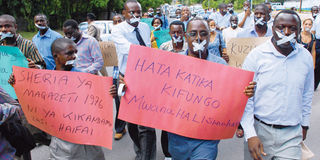Frustration, anger over decision to ban Mawio

What you need to know:
Mawio was on Thursday banned for two years after publishing the story, a day after President John Magufuli ordered the media not to rope former heads of state into the mining scandal
Dar es Salaam. Media stakeholders have said they are disappointed by the government’s decision to ban a weekly tabloid, Mawio, over a story linking former presidents to the mining scandal.
Mawio was on Thursday banned for two years after publishing the story, a day after President John Magufuli ordered the media not to rope former heads of state into the mining scandal.
Mr Kajubi Mukajanga, executive secretary of the Media Council of Tanzania, described the ban yesterday as unjust and against the principles of freedom of expression.
He said the ban implies that there is intolerance of opposing views in the country.
“How is it possible to have serious discussions on matters of public interest while isolating some key players? This is against the principles of collective responsibility,” he said, adding that the tabloid did not deserve the punishment.
Tanzania Editors Forum (TEF) secretary Neville Meena said the ban was an “infringement of media freedom and editorial independence”.
“The government rushed to making a decision. The ban should be reversed,” he said. He said the media shouldn’t be told what to write or not to write.
Mr Meena said there was no way the story of how Tanzania has been ripped off its mineral resources since 1998 can be discussed without mentioning people who have been leading the country during that time.
“Any good follow-up story needs background information to support the facts; so the decision to block media practitioners from mentioning some public figures who were in active leadership positions during that time is surprising,” he said.
He added: “Since Mawio is a weekly publication which comes out on Thursdays, there is no doubt that when the order was issued on Wednesday, the paper was in the final stages of printing, the minister should have considered this.”
Mr Aboubakar Karsan, executive director of the Union of Tanzania Press Clubs (UTPC), urged consensus between media stakeholders and the government.
He said the UTPC was against the heavy penalties imposed on media outlets, without giving room to negotiations and discussions.
“Whoever feels abused or mistreated by whatever content run in the media should file a complaint with professional institutions such as the Media Council of Tanzania (MCT).”
For their part, socio-political commentators urged media practitioners to uphold professionalism to avoid unnecessary conflicts with government.
Mr Rachel Yusuph, a journalism and mass media lecturer from the University of Iringa, urged the Ministry of Information to consult with media houses on issues of press freedom and ethics.
An assistant mass communications lecturer at the Songea branch of St Augustine University of Tanzania (Saut), Mr Denis Mpagaze, said media institutions should have acted swiftly on President Magufuli’s instructions not to associate former presidents with the mineral concentrates saga.
“Soon after President Magufuli warned the media not to associate former presidents with the mineral concentrates issue media institutions should have, at least, issued a statement to condemn that warning because it goes against principles of press freedom. By keeping quiet, media stakeholders, implicitly agreed with the President’s order,” Mr Mpagaze noted.
ACT-Wazalendo leader Zitto Kabwe also condemned the government’s decision saying the ban was a clear violation of the freedom of information in the country.
“I urge the government to lift the ban on the newspaper immediately because it is unlawful,” Mr Kabwe said.




